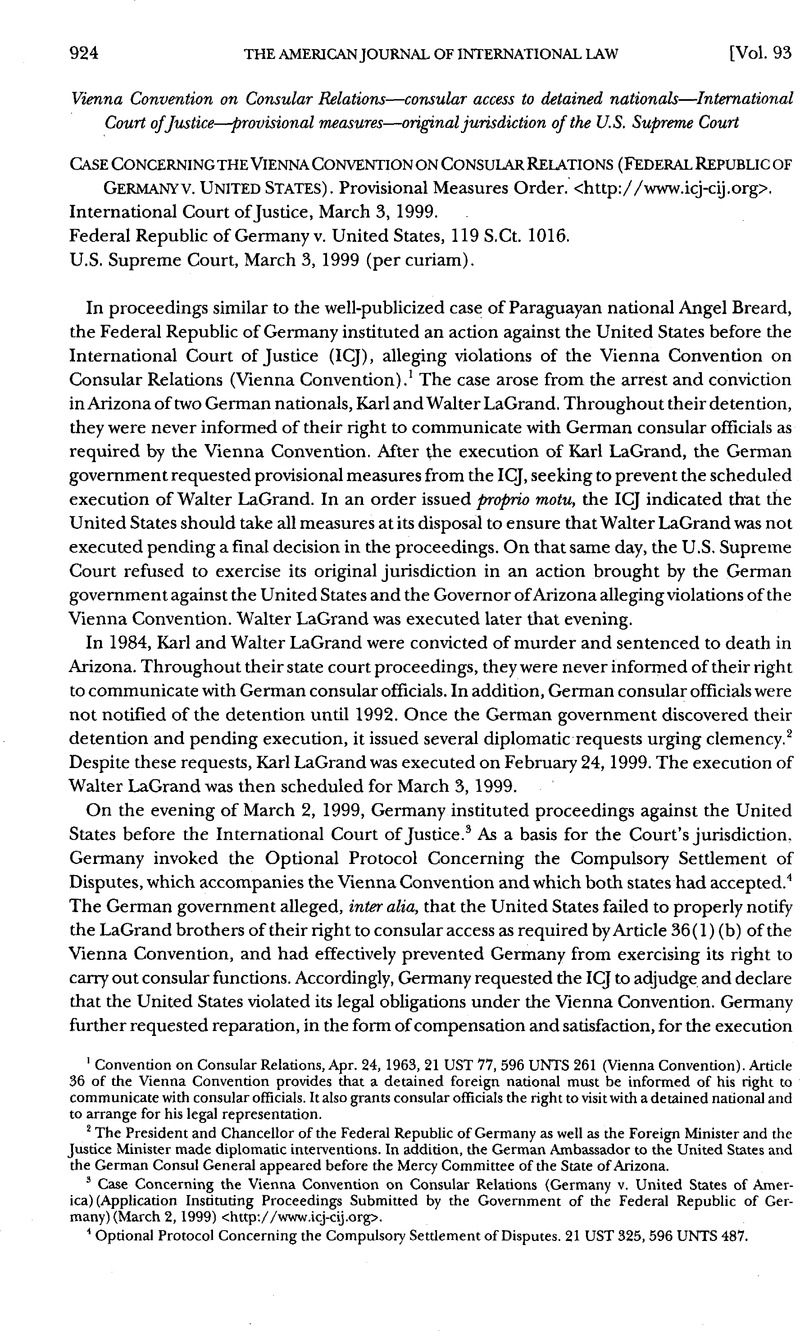Article contents
Vienna Convention on Consular Relations—consular access to detained nationals—International Court of Justice—provisional measures—original jurisdiction of the U.S. Supreme Court
Published online by Cambridge University Press: 27 February 2017
Abstract

- Type
- International Decisions
- Information
- Copyright
- Copyright © American Society of International Law 1999
References
1 Convention on Consular Relations, Apr. 24, 1963, 21 UST 77, 596 UNTS 261 (Vienna Convention). Article 36 of the Vienna Convention provides that a detained foreign national must be informed of his right to communicate with consular officials. It also grants consular officials the right to visit with a detained national and to arrange for his legal representation.
2 The President and Chancellor of the Federal Republic of Germany as well as the Foreign Minister and the Justice Minister made diplomatic interventions. In addition, the German Ambassador to the United States and the German Consul General appeared before the Mercy Committee of the State of Arizona.
3 Case Concerning the Vienna Convention on Consular Relations (Germany v. United States of America) (Application Instituting Proceedings Submitted by the Government of the Federal Republic of Germany) (March 2, 1999) <http://www.icj-cij.org>.
4 Optional Protocol Concerning the Compulsory Settlement of Disputes. 21 UST 325, 596 UNTS 487.
5 Case Concerning the Vienna Convention on Consular Relations (Germany v. United States of America) (Request for the Indication of Provisional Measures of Protection Submitted by the Government of the Federal Republic of Germany) (March 2, 1999) <http://www.icj-cij.org>.
6 Id., para. 7.
7 Under Article 75(1) of the Rules of Court, the ICJ “may at any time decide to examine proprio motu whether the circumstances of the case require the indication of provisional measures which ought to be taken or complied with by any or all of the parties.”
8 Under Article 74(4) of the Rules of Court, “the President may call upon the parties to act in such a way as will enable any order the Court may make on the request for provisional measures to have its appropriate effects.” Because the President of the Court was a U.S. national, Vice-President Weeramantry exercised the functions of the presidency in the case.
9 International Court of Justice, Press Communique 99/7 (March 2, 1999) <http://www.icj-cij.org>.
10 Case Concerning the Vienna Convention on Consular Relations (Germany v. United States of America) (Provisional Measures Order) (March 3, 1999) <http://www.icj-cij.org>.
11 Id., para. 21.
12 Id., para. 29.
13 Id., para. 25.
14 Id.
15 Case Concerning the Vienna Convention on Consular Relations (Germany v. United States of America) (Separate Opinion of President Schwebel) (March 3, 1999) <http://www.icj-cij.org>.
16 In aletter submitted to the Supreme Court, the Solicitor General opposed the action. In his view, the “Vienna Convention does not furnish a basis for this Court to grant a stay of execution,” and “an order of the International Court of Justice indicating provisional measures is not binding and does not furnish a basis for judicial relief.”
17 Federal Republic of Germany v. United States, 119 S.Ct. 1016 (1999).
18 Article III, Section 2 of the Constitution provides that “[i]n all Cases affecting Ambassadors, other public Ministers and Consuls, and those in which a State shall be a Party, the supreme Court shall have original Jurisdiction.”
19 119 S.Ct. at 1017.
20 Id. at 1018.
21 Id.
22 In a separate action, the Supreme Court lifted a stay of execution issued by the Ninth Circuit prohibiting Walter LaGrand’s execution by lethal gas. Stewart v. LaGrand, 119 S.Ct. 1018 (1999).
23 See generally, Agora: Breard, 92 AJIL 666 (1998); William J. Aceves, Intemational Decisions: Application of the Vienna Convention on Consular Relations, 92 AJIL 517 (1998).
24 Case Concerning the Vienna Convention on Consular Relations (Paraguay v. United States) (Provisional Measures Order) (Apr. 9, 1998) <http://www.icj-cij.org>.
25 Breard v. Greene, 523 U.S. 371 (1998).
26 Under Article 88(1) of the Rules of Court, “[i]f at any time before the final judgment on the merits has been delivered the parties, either jointly or separately, notify the Court in writing that they have agreed to discontinue the proceedings, the Court shall make an order recording the discontinuance and directing that the case be removed from the list.”
27 U.S. Department of State, Office of the Spokesman, Text of Statement Released in Asuncion, Paraguay, Nov. 4, 1998 <http://www.state.gov>.
28 Id.
29 See, e.g., United States v. Alvarado-Torres, 45 F.Supp. 2d 986 (S.D. Cal. 1999); United States v. Lombera-Carnorlinga, 170 F.3d 1241 (9th Cir. 1999).
30 In December 1997, the Mexican Government requested the Inter-American Court of Human Rights to issue an advisory opinion regarding the interpretation and application of the Vienna Convention and the right of consular access. The Inter-American Court issued its advisory opinion on October 1, 1999. [Editor’s Note: The decision of the Inter-American Court will be reported in a subsequent issue.]
31 On September 16, 1999, the German government submitted its Memorial to the Court. The United States is scheduled to submit its Counter-Memorial on March 27, 2000.
- 6
- Cited by




